- Home
- Lionel Shriver
A Perfectly Good Family Page 4
A Perfectly Good Family Read online
Page 4
25
at my feet the floor was knee-deep in plastic bags. On the refrigerator, sheaves of coupons were magneted to the door. Beside them, a last grocery list exorted with shy urgency, ‘t.p.!’ She had never bought double-ply in her life.
I rooted around for a spoon among the ancient airline peanuts packets (Piedmont had long before gone to the wall); from between the gas-war glasses, I retrieved a send-away-for-your-free Nestlé’s Quik coffee mug.
The prospect of a grown woman who is comfortably well off cutting out three logos from successive purchases, stuffing and stamping an envelope and remembering to tuck it in the postbox and raise the flag, all for one mug covered in advertising for chocolate powder, frankly made my jaw drop.
Waiting for coffee to drip (through a cone that had never quite fitted the jug and tipped precariously when filled), I slumped to the table.
My mother’s kill-joy obsession with minuscule frugalities was so unnecessary. Her husband had been a successful civil rights lawyer, later a state Supreme Court judge, and despite the cheques to the United Negro College Fund and his assumption of countless down-and-out discrimination cases pro bono, they’d never hurt for cash. I’d had a drink with their estate lawyer when my father died to confirm she was provided for, and he’d been reassuring. So why were we raised on A&P powdered milk?
It’s true that thrift was a game to my mother, and she must have enjoyed it. And habits like clawing all the cartilage off the chicken carcass and throwing it into the soup would have been installed in childhood: through the depression, her father was a hard-up typewriter repairman; they’d stinted on sugar through the war. She married in the fifties, when whole magazine spreads were devoted to limp-potato-crisp casseroles.
She had never held a job, and her only contribution to the family coffers was to not-spend; so day-old baked goods empowered her. But I resisted seeing Eugenia McCrea as a creature of era; I preferred her as uncommonly cheap. Plenty of her cohorts had gone on to reach for new Ziploc bags rather than washing the old ones relentlessly and sealing a lone half of uneaten spud—perish the thought she should throw it away—into greasy plastic. In the scrimping of this larder you could see it: she must have felt so undeserving.
A sensation to which I had only contributed. She had cooled my forehead with damp cloths when I was feverish, whereas my 26
father, when I was carsick, blew his stack. Yet, like my mother herself, to others I promoted my champion-of-the-underprivileged Dad. When I returned home in adulthood, I debated affirmative action with my father in the sitting room while my mother scoured this yellowed sink.
Hadn’t he told us himself that he’d been ‘waiting for his children to grow up’ so that we could at last ‘engage in adult conversation’? In the meantime we bored him. So he left the raising of his offspring to his wife, and then had the temerity to rage when his eldest didn’t turn out as he’d have liked. When I was young he was so rarely in evidence, forever in ‘meetings’, that my favourite birthday present was to spend an hour with my father alone, and to do so again I would have to wait another year. Gruff, inaccessible, buried in briefs with glasses down his nose, Sturges McCrea had been more icon than parent to me, and in truth I owed him little.
You’d think that the one reward for doing all the puke-wiping and nappy-dunking would be a little credit; instead we dismissed our mother for being so apparently unimportant. So she redeemed herself by mailing off for coffee mugs, and settled for victories of remarkably intact quick-sale vegetables while my father brought home honorary degrees.
‘I thought you might want some milk.’
Truman delivered a carton, and sat down with his panda mug.
‘You’re not spending much time downstairs?’
‘It doesn’t feel like mine yet.’
Yet. I didn’t take issue, for Truman charmed me in the morning. He took hours to wake up, and rubbed his eyes, bear-like, with the backs of his hands. For years he’d collected panda posters from Peking, T-shirts from the National Zoo, and mugs like the one he was slurping from, on which Ling-Ling nibbled bamboo. In fact, he looked like a panda: with dark rings around his eyes and a myopic bumbling amble, especially on rising, like a massive, muscular mammal I knew to be vegetarian and could tease if I liked.
‘Ready for the big pow-wow?’ Though a question, the sentence fell.
‘As I’ll ever be. I noticed nobody’s cleaned out the fridge.’
‘That’s right, nobody has.’
‘There’s some furry yellow squash casserole in there that could cure all Tanzania of TB.’
27
Truman wandered to the sink; he compulsively tidied. ‘Nuts.’ He stopped. ‘The sponge.’
I turned to glimpse, fossilized by the faucet, the horror of Truman’s childhood. It had been his job to wipe the kitchen table, and my mother could not have started a fresh sponge more than once a year. The same fastidious boy he’d been then, Truman wet it by knocking it into the sink and running the tap; he squeezed it with a fork. Touching the sponge with only his fingertips, he nudged the foetid greenish square through my sloshed coffee. He scrubbed his hands, sniffed his fingers, and washed them again.
‘How much can a new sponge cost?’ he despaired. ‘Thirty cents?’
As his first act of revolution, Truman pinched the reeking tatter by its very corner and dropped it in the bin.
Not expecting any surprises, I wasn’t dreading our conference with the estate lawyer. If anything, I looked forward to seeing Hugh Garrison, who had handled the particulars of my father’s death two years before.
For a lawyer, he was unprepossessing, big on corduroys and always tugging at his tie; when he resorted to legal jargon, his eyebrows shrugged apologetic inverted commas on either side. He and my father had been colleagues, though I suspect that during our one after-hours beer at Brother’s Pizza two years back I got to know him better than my father had over two decades. Had they met socially, my father would have held forth about how Carter was a much better president than reputed to be (he identified with Jimmy Carter, a nuclear engineer maligned as a moron because he had a Southern accent). Sturges McCrea liked issues. Told your wife had just given birth to a paraplegic, he’d start in straight away with the rights of the handicapped; it would never occur to him to ask how you felt.
At Brother’s Pizza I’d been braced to move on to what a marvellous spokesman of the downtrodden my father had been, how fair-minded and self-sacrificing, and what a shame…The usual. Hugh Garrison launched into no such thing.
‘I’ll never forget,’ he began on a second Bud, ‘dinner at your parents’, oh, fifteen years back. I’d litigated a case, see—some arthritic biddy over in Cary with a fair stack of cash in the mattress had been tended by a black maid for years. Since her kids hadn’t been giving her the time of day, the lady’d changed her
28
will and left lock, stock, and barrel to the maid. Seems they’d become good friends, in a funny way. I’d made the amendments myself, but once the old bird kicked it, the kids started to squawk. Challenged their momma’s competence. In court, the new will was invalidated, and I lost the case. Felt terrible about it. Sent the maid to your dad for the appeal. No question as to that jury’s logic: any dowager of good Southern breeding who left her house to nigger help—pardon my French—was off her rocker. But since the old bat had been hearing the occasional voice, proving racial bias was living hell.
‘Point being, Sturges and I had been working long and late and I was plumb tuckered. So we knock off and your mother cracks open a fresh bottle of apple juice—’
I laughed. ‘The Hard Stuff.’
‘My nose got shoved so far out of joint,’ he admitted, ‘that I asked for a beer. Eugenia looked at me as if I’d farted.’
‘My mother thinks beer is low class.’
‘So we sipped our apple juice and then came the nubs of cheddar from the bottom of the drawer—’
‘With the mould scraped off.’
&
nbsp; ‘Not all the mould scraped off. Sturges cranked up the sound-track to 2001, when I had a yen for Ry Cooder. I thought maybe we’d get around to the Series, but over the trombones your Dad started shouting about third-world debt. Then it hit me: Strauss, stale crackers, hard cheese and guilty politics—this was Sturges McCrea’s idea of a good time.’
That’s when the idea first entered my head that my parents might be tiresome to other people.
Averil pouted at being left behind, but the will-reading was for immediate family only. I paused at my parents’ Volvo, while Truman lurched to the driver’s seat. I’ll drive if you like, I offered, and he said no that’s all right and I clued that he always drove, never mind that this car now was a third mine. I sensed a burgeoning attitude problem.
‘Can we agree to ditch Mordecai after the meeting?’ Truman proposed at the wheel.
‘We might have dinner. He’s your only brother, he lives a mile away from you, and you’ve seen him twice in two years. For funerals.’
29
‘He’s a bore and a know-it-all and he ignores me. He never fails to make some snide crack about my being in school, and then we have to listen for hours about the future of digital recording.’
I would happily describe my brothers’ relationship to each other, except that they don’t have one.
‘A single evening won’t kill you.’ That was that. With Truman, I am sufficiently accustomed to having my way that I don’t even notice when I get it.
We parked on Hillsborough, a leafy and majestic street in summer, T-junctioning into the state capitol, but looking the worse for wear with dogwoods and black walnuts too bare to obscure the failing businesses behind them. Downtown Raleigh was crumbling and dispirited, though like my parents’ kitchen I was glad it had not been done up. Several tower blocks broke the skyline, but for the most part Raleigh’s architecture had stayed low-lying, and Hillsborough was still lined with pipe shops, diners serving grits and black-eyed gravy, and the flagging Char-coal Grill. The rest of this town had multiplied threefold since I’d lived here, its perimeters bleeding to Durham and Chapel Hill, so it was comforting to find a stretch like this one that hadn’t changed much.
There was one more bit of landscape that hadn’t changed much.
I had to smile. Two blocks down, in silhouette he might be mistaken for my father, with that distinctive side-to-side swagger and ground-eating galumph. But my father’s purposeful headlong look would have aimed at the NC Supreme Court around the corner; Mordecai leaned towards a different sort of bar.
As he drew a few strides closer, the paternal resemblance fell away.
For one thing, he’s shorter; both my brothers battled the metaphorical notion that they had not risen to their father’s stature in any respect.
While my father’s umber hair had shocked in a Kennedy-style wave and was cropped close at the neck, Mordecai hadn’t cut his hair since he was twelve; he bound the waist-long locks into three tight pigtails.
His colouring was my mother’s: when unbraided, the hair was lush and dark; his brows were rich and low, his lips full. If he weren’t always vulturing his forehead and crinkling his mouth into an anal scowl, his face would look pretty.
The sun out, Mordecai was wincing, the cast of his skin a sallower shade than the wan winter light. While my mother’s tones 30
were olive, all of Mordecai was yellow, down to his thick rimless glasses whose lenses he special-ordered with a urinous tint. The unhealthy jaundice of his complexion was, I knew, distilled from liquor and heavy food and a vampire’s schedule of hibernating all day and working all night. As he cringed down the poppled pavement, I doubted Mordecai’s nocturnal flesh had seen more than a few rays of sunshine for twenty-five years. That may have left him safe from skin cancer, though if so that would be the single disease to which he had failed to issue a personalized invitation.
I raised my hand in salute, but not too high, lest Truman see me as eager.
When my big brother grinned back, his teeth matched his skin. At fifteen he’d declared that for his two live-in girlfriends he wanted to
‘taste like himself’ and refused to brush. The plaque build-up had been sticky and flaxen, and though he now seemed to conform to ordinary standards of hygiene his lopsided smirk remained ochreous.
‘How’s tricks, Corrie Lou?’ Mordecai was the only living person who could employ my childhood’s atrocious double-name without my taking his head off.
‘Yo, Mortify.’
He kissed me on the forehead; his lips were soft. I caught a tinge of alcohol on his breath. He grazed my temple with his right hand, whose first two fingertips were lutescent with tobacco, the nails saffron and curling. Though Mordecai was only thirty-eight, his hands, creased with wood stain and machine oil, crosshatched with scars from the carelessness of hirelings, were those of a much older man.
‘True.’ Mordecai granted his brother a perfunctory nod; Truman grunted.
‘You lucked out with parking,’ I chattered. ‘That army truck must take up at least two metres.’
Hee-hee, went Mordecai—his laughter, too, was prematurely aged, geezery and good-old-boy, from slumming with tar-heel construction workers who dropped out of high school. ‘Nope. Yellow lines all the way. Remember that Justice Department card Father kept on the dashboard of the Volvo? After his funeral, I swiped it.’
‘I wondered what happened to that,’ Truman muttered.
31
‘I find that hard to credit,’ I said. ‘The cops believing an army surplus troop transporter belongs to the Supreme Court.’
‘Hey, it’s worked so far. Not a ticket for two years. Figured True here wouldn’t use it. That wouldn’t be right. That would be lying.’
The pavement was too narrow for the three of us to proceed abreast.
I didn’t feel comfortable coupling clearly with one brother over the other, so trailed a bit behind the elder and a bit before the younger, our trio cutting a diagonal of birth-order down the walk.
‘Man, I hope this Garrison character can shuffle paper fast.’ Mordecai rubbed his hands. ‘I could sure use the cash.’
Truman rolled his eyes.
Hugh Garrison’s office was pastel and travel-postery, with a round table and straight-backs next to his desk. I was obscurely disappointed; in my imagination, we’d be seated at a long darkwood conference table, with portraits on the walls, emerald bankers’ lamps and heavy crimson drapes. I’d read too many murder mysteries.
Hugh shook hands and offered condolences about my mother. When he invited us to the table, Mordecai and Truman found themselves next to each other; Truman fussed with his pea coat and managed to insert me between them. ‘So what,’ I said, ‘you read the will aloud to us?’
‘Not unless you insist,’ said Hugh, spreading over his chair and hiking his pants so the hairs above his socks showed. He was a rangy, casual man with a no-nonsense air. ‘I think I can give ya’ll the gist without the being-of-sound-mind-and-body nonsense.
‘Now,’ he began, spreading papers before him. ‘I guess your parents told you that their estate would be divided equally between the three kids. So I assume they also apprised you guys of their bequest to the ACLU?’
He must have looked up to find a wave of shock registering across all three faces.
‘It’s thanks to the ACLU,’ Truman grumbled, ‘that we never had a clean sponge.’
‘Rubbish,’ I said, recovering. ‘We’d have had a putrid sponge if they hadn’t donated a dime. A smelly sponge is a point of view.’
‘All I know is that to Father,’ said Truman, ‘the primary charity 32
of non-profits was to take money off his hands. With the small fortune Father shovelled that ACLU outfit over the years we could have bought enough A&P eight-packs to wipe up the Atlantic Ocean.’
Hugh looked edgy. ‘Mean your folks never informed ya’ll that the American Civil Liberties Union was willed a quarter of their estate?’
‘ What?’ said Truma
n and Mordecai at once, which may have been the only time in their lives they did something together.
I shot Hugh a droll smile. ‘The fourth child.’
‘You said “estate”—’ The words were strangling in Truman’s throat.
‘Does that include Heck-Andrews, or not?’
Hugh rubbed his temples. “Fraid so. Last year your momma expressed second thoughts about keeping her house in this bequest, but she never put word-one in writing. Nobody figured her heart condition was so serious, and as usual—that’s the way people are with wills—there seemed all the time in the world to change her mind.’
‘Could you testify in court—’ Mordecai leaned forward ‘—that she intended to revise the will?’
‘No, and besides, she’d been wavering. She wanted to do—’
‘ What Sturges would have wanted,’ Truman recited.
‘Bingo.’
‘Let’s talk turkey,’ Mordecai demanded, clicking the silver knobs of his bolo tie on the table top. ‘In round numbers, what’s the lowdown?
Cut to the chase, bottom line.’
Hugh’s head tilted with a trace of dismay towards my older brother.
I myself had never been sure whether to find Mordecai refreshingly down to earth or, as Averil would say, crass.
“Sides the house? I’ve taken a gander at this portfolio, but couldn’t give you an exact figure. There’ll be penalties for liquidating long-term investments prematurely, and state taxes—’
‘How much?’ insisted Mordecai.
‘Before deductions, ballpark? Round about $300,000. To be divided between the—four of you.’ He smiled.

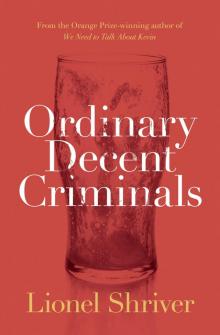 Ordinary Decent Criminals
Ordinary Decent Criminals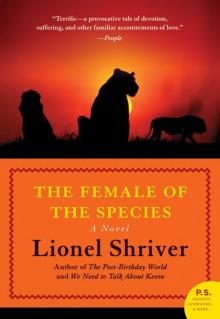 The Female of the Species
The Female of the Species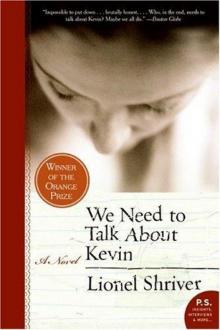 We Need to Talk About Kevin
We Need to Talk About Kevin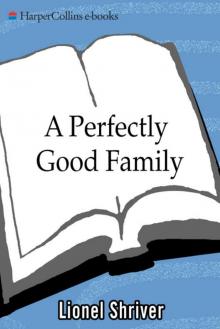 A Perfectly Good Family
A Perfectly Good Family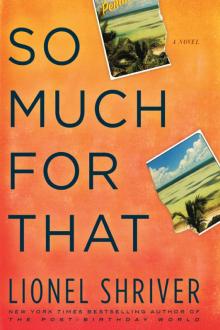 So Much for That
So Much for That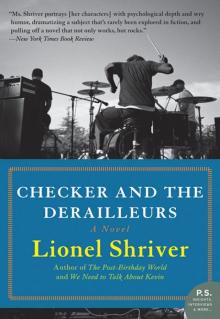 Checker and the Derailleurs
Checker and the Derailleurs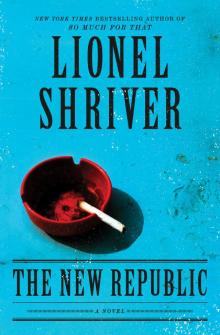 The New Republic
The New Republic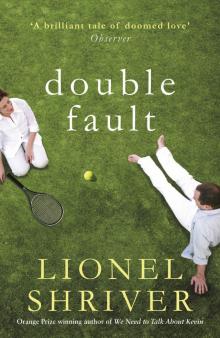 Double Fault
Double Fault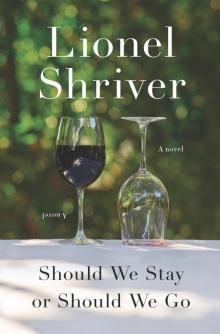 Should We Stay or Should We Go
Should We Stay or Should We Go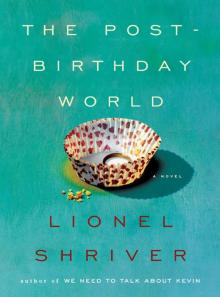 The Post-Birthday World
The Post-Birthday World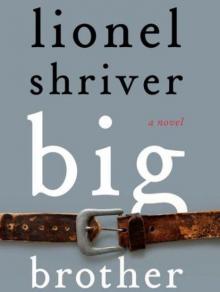 Big Brother
Big Brother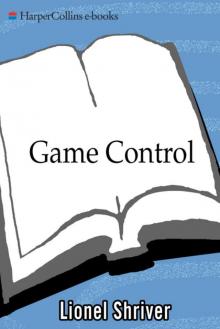 Game Control
Game Control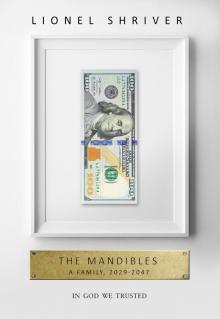 The Mandibles
The Mandibles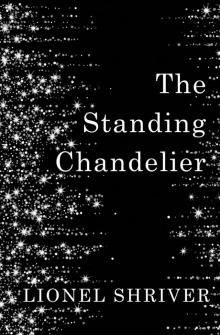 The Standing Chandelier
The Standing Chandelier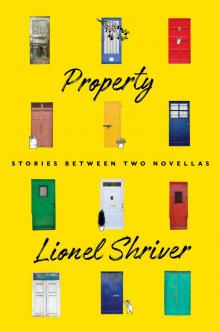 Property
Property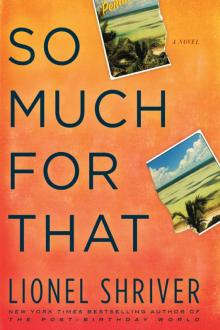 So Much for That: A Novel
So Much for That: A Novel